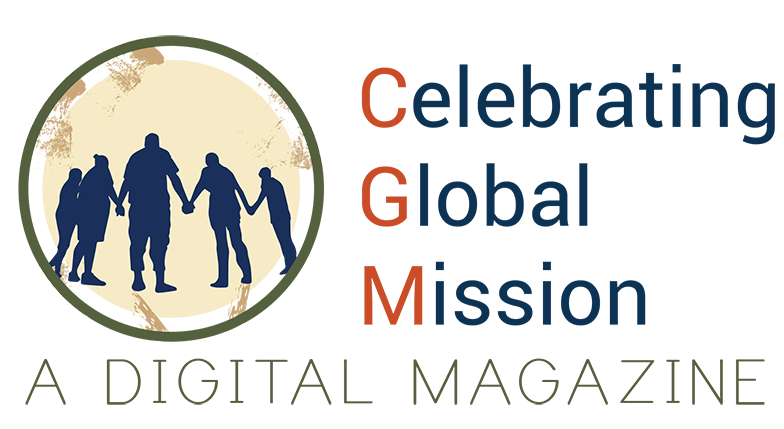The Great Commission
“Therefore go and make disciples of all nations…”
— Matthew 28:19
The way forward in missions has changed over the years. About 150 years ago, there were those who felt called and equipped to respond to the words of Jesus as recorded in the last words of the book of Matthew to “go and make disciples of all nations.” (Matthew 28:29). This is known as the Great Commission, and men and women have been responding to that directive since Christ uttered them upon His ascension to heaven.
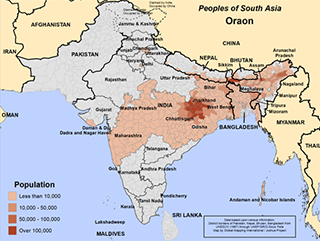
Oraon people group in India
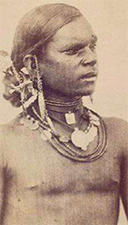
Oraon man circa 1868
A small group of missionaries went to a people group in India, known as the Oraon. They learned the language, but were able to translate only parts of Scripture into Kunrukh (also spelled Kurukh) as there was no known alphabet. For 100 years, the Scripture used was Hindi, a popular and well-known alternative, but not the heart language of the Oraons.
The Oraons are one of the larger people groups in India, with about 3.5 – 4 million people. Animists in religion, but “Hindu” by virtue of their country of birth, small numbers of people began to come to faith in Jesus in the late 1800’s. According to research since then, Oraon Christians have generally become better educated and thereby seen as having better opportunites in life. About a fifth of the Oraon population is now classified as Christian.
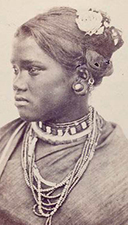
Oraon woman circa 1868
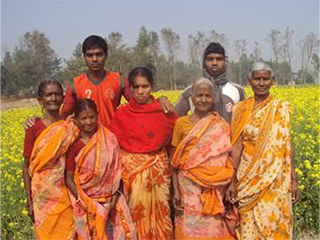
Oraon family
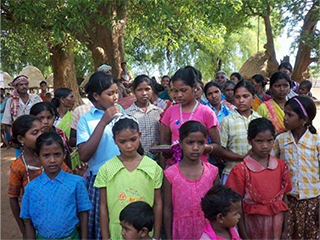
Kurukh children
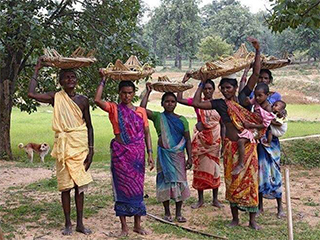
Oraon group
Kurukh Translation
To celebrate the milestone of the turn of the 21st century, a gathering of Oraon believers determined to translate and publish the Bible in their heart language of Kurukh. Christians and non-Christians alike celebrated this undertaking, as people in the community had not seen a book this thick in their mother tongue.
The Lutheran Church raised the money for translation and the Bible Society of India helped with the publication of a Kurukh translation of the Scriptures. For the past 20 years, many congregations have read both Hindi and Kurukh translations side-by-side during worship.
Controversy
However, in 2008 protests began to arise from within the Oraon community itself. By that time words that had been used in the translation had acquired additional political and cultural meanings and non-Christian Oraons were offended at some of the implications. The controversy escalated to such an extent that those who had helped in the translation were targeted with death threats and burned in effigy. The violence continued for one month, with believers having to hide their copies of the Kurukh Bible. All of this was over one particular word, which had been neutral at the time of translation, but in the ensuing eight years had a new understanding.
Protection of tribal culture has become very important in the 21st century, and not just to the Oraons. For many, it is incongruent that one can be a Christian and an Oraon. To them, this implies a return to cultural roots—and that to be Indian is to be a Hindu. The claim was made by Oraon non-believers that Christians were trying to destroy the Oraon culture and religion.
The church quickly apologized for the use of the offensive word. However, it became clear that the motive for the violence was not just the word, but to ban the Scripture so that the people could not read in their mother-tongue. The controversy even went to the State senate, where publication and sale of the Kurukh Bible was banned. It remains there to this day, with the ban in place as the court has still not decided this case. It was ruled that whenever the case was brought up, a judgement could not be made with only one party in attendance. As long as the prosecutors do not show up, the ban remains in place.
At this point, one may be wondering: how can this be a celebration of missions? The Bible is banned, the case seems to be stalled.
“For the word of God is living and active, sharper than any two-edged sword, piercing to the division of soul and of spirit, of joints and of marrow, and discerning the thoughts and intentions of the heart.”
— Hebrews 4:12 NIV
“…so shall my word be that goes out from my mouth; it shall not return to me empty, but it shall accomplish that which I purpose, and shall succeed in the thing for which I sent it.”
— Isaiah 55:11 ESV
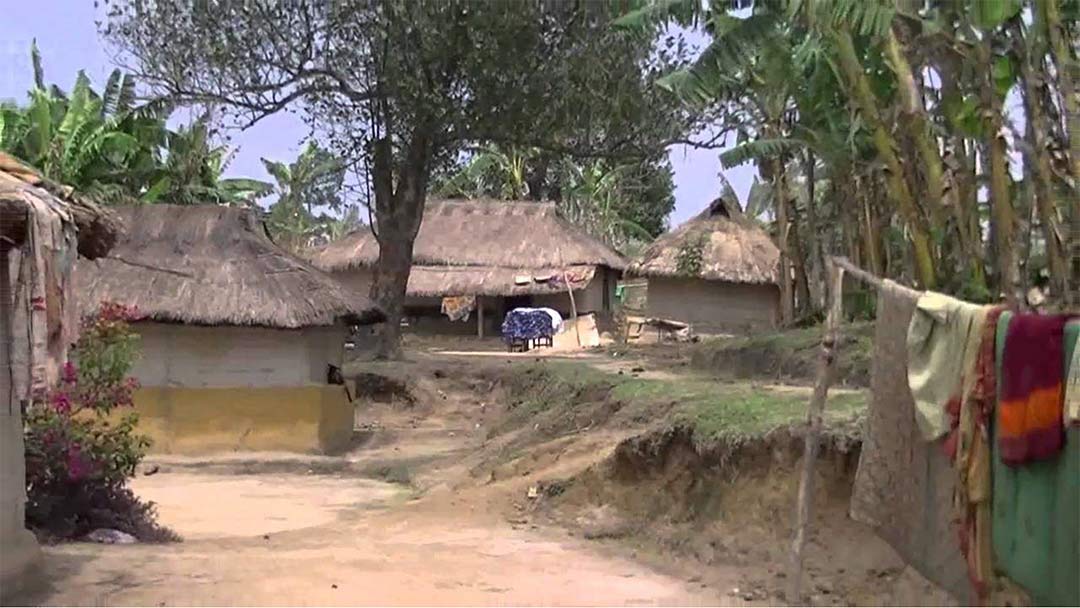
Oraon village
Bilingual Bible
A linguist and prominent leader in the Oraon community has compared the Kurukh Bible to the German Bible of Martin Luther, the Tamil Bible of India, and the English Bible of William Caxton.
The publication is important because it is the Word of God.
It is also important because it speaks in the language of their heart.
It was obvious that a new translation was needed. At 90 years of age, the Bishop of the church singlehandedly began a new translation of an Oraon-English Bilingual Bible. A Bilingual Bible was an important way to update the Scriptures and keep the Oraon community connected to their mother tongue. Unfortunately, in 2018 the translation was halted as the Bishop could not continue because of poor eyesight. Still, a large part of the Old Testament had been completed—from Genesis through Jeremiah. And then Covid claimed his life in 2021.
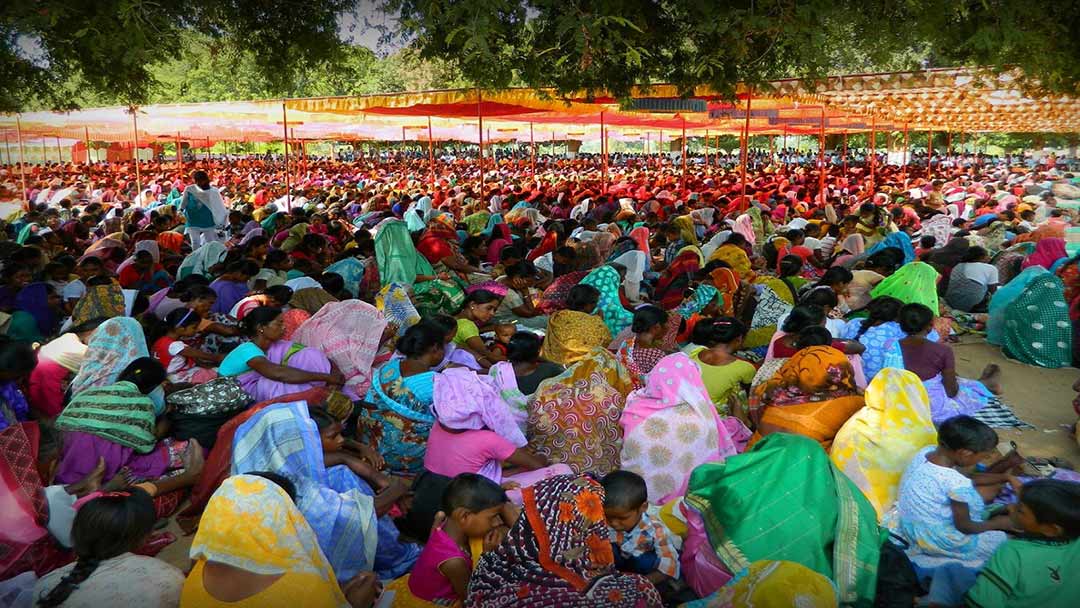
The Lutheran Church is one of only three churches to attain autonomy as an indigenous church as early as 1919. When German missionaries returned to Germany in 1914, the church in India was left without leadership. For five years they struggled before members voted in July 1919 to take upon themselves the responsibility of church leadership and an independent church. This picture is from a gathering of women at a pre-COVID-19 conference, circa 2019.
In November of 2021 a few theologians and translators determined that this project must go forward. With a team of all kinds of professionals from across the continent, progress is going forward with the understanding that this is one way to engage younger generations with their mother tongue of Kurukh.
Recently, an appeal has been issued by these young professionals working on this project for prayer covering. At present, the community people are praying for a new way to have the Word of God in their heart language. A Bilingual Bible may be just the answer!
Pray!
For more information on how you can contribute in prayer for this exciting project, contact wmpl.org
Want more info?
- Email the author.
- Like this article? Share it using the social media buttons below.
- Want a print copy? Click the printer icon below.
- And please rate the article!
